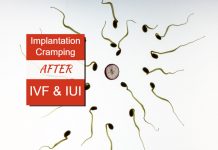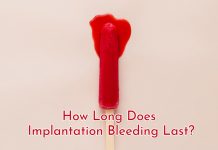Implantation Bleeding After Missed A Period? Implantation bleeding can happen between 7-12 days after ovulation. Anything before seven days is early egg embedment and after 12 days is late egg embedment. It is possible that you spot during the early stages of pregnancy because there are hormonal changes. You might take this as late implantation bleeding, but that is not the case.

Implantation Bleeding After Missed A Period?
Women who have a very short menstrual cycle of about 21 days may experience late implantation. It is also not healthy physiology to have such a short cycle.
But in that case, you can have late implantation bleeding. In most cases, implantation occurs ten days after ovulation.
Implantation bleeding is not a compulsory event, and only 33% of women have it. So it is not essential that you need to have implantation spotting and there is a 100% possibility of having a healthy pregnancy without it.
Implantation bleeding after the missed period is because of late implantation.
When does implantation occur before period?
Implantation occurs before a week or four days from missed period. After implantation, the body begins producing hCG and pregnancy test shows the desirable two lines. It is the time for the due period which women miss due to pregnancy.
Implantation occurs about 7-12 days after ovulation depending upon the rate at which the zygote divides and travels down the tubes. The time of ovulation and conception is nearly the same. Both events can have a maximum gap of 24 hours. Beyond that, the egg ceases the viability.
Implantation can happen as early as three days after ovulation. The time of implantation 11 days before missed period is the earliest possible. The first three divisions of egg take about three days and can finish earlier and move on dividing.
Is there late implantation?
Late implantation may be relative to a short menstrual cycle. In typical cases, implantation being a rapid process occurs before a week from the period. But due to fluctuations in the menstrual cycle, the duration for implantation is from 7-12 days.
Implantation after 12 days from ovulation is late egg embedment. If the egg takes longer to complete the process of cleavage, then there can be late egg embedment. The endometrial lining gets more glycoproteins and other material and thickens for implantation.
During this process, if there is any delay due to the natural makeup of the body, then it will eventually cause late implantation. But the chances are very rare.
Can spotting after late period be implantation?
Some experts say that until implantation occurs the body of mother doesn’t recognize the embryo. It will have a regular menstrual cycle, and egg embedment will happen. You will miss your period next month. It sounds possible and impossible at the same time.
When you think that during the period the lining of the uterus will go away then where will the blastocyst implant.
In other cases, the constant regeneration of the endometrial lining makes it possible. Even if there is a period, a new lining will form for implantation. When implantation begins, the pregnancy hormone will start building and prevent menstruation.
Can implantation bleeding occur after four days after the missed period?
Implantation bleeding after missed period seems less likely as days pass. Pregnancy tests claim to detect pregnancy five days before missed period. And if implantation is not over the hCG hormone will be far less.
Normally by the day of missed period hCG levels should rise to 25 mIU/mL which takes five days. Implantation bleeding after four days from missed period sounds unlikely.
It may be breakout bleeding instead which happens during pregnancy. Pregnant women may sometimes have breakout bleeding at the time of missed period.
Implantation bleeding after a missed period
Missed period after implantation is the right sequence. Nature has set patterns for things. If pregnancy doesn’t occur then after two weeks, there will be a period. Pregnancy must happen before that if it is to happen.
Implantation bleeding after a missed period is not the normal pattern, but an exception to nature’s rule. You can miscalculate your menstrual date, which is a very common thing. Most women believe that their period is like a monthly anniversary. No, it is not.
Usually, the menstrual cycle is of 28 days, and the month is for 30 days. Each time you cross the month of the calendar you’ve extra two days. Your period ideally must shift! It does for most.
Miscalculation and a slower build-up of hormones and factors for egg cleavage can cause late implantation. Late egg embedment will cause a delay in implantation spotting taking it after the due date.
The reason for the normal occurrence of, a missed period after implantation is not egg embedment. Instead the old corpus luteum or eggshell secretes progesterone keeping the uterine line intact.
As the level of progesterone from the egg shell falls, it causes ‘period’ or breakdown of the lining.
When the woman conceives, the body continues the production of progesterone, keeping the wall of the uterus to hold to the baby. So you don’t get your period! And late implantation, on the other hand, causes the spotting after the missed period!
Thus, implantation has no relation with period except timing reference.
What are the reasons for bloody discharge late period?
Sex during pregnancy can also cause spotting.
Low lying placenta can lead to spotting and threatened miscarriage is another cause for it. After implantation, the mother’s body checks the embryo for any genetic defects.
If there is any abnormality, the embryo undergoes very early miscarriage. Chemical pregnancy behaves like a healthy pregnancy at an early stage and later starts bleeding.
Molar pregnancy is another condition which leads to heavy bleeding due to abnormal tissue forming in place of the embryo.
Unexplained bloody discharge during pregnancy with symptoms like itching and burning may be because of bacterial vaginosis or yeast infection.
If you have symptoms like ovary pain during pregnancy along with spotting, consult a doctor.
Spotting During pregnancy is common, and you can have it anytime. Cramps, breathlessness, uneasiness and heavy bleeding are not normal.
At times when you take the right step at the right moment, you can save yourself from extreme complications.
Don’t ignore any heavy bleeding or painful symptoms.




![Implantation Bleeding With Twins [How long does IB last with twins?] Implantation Bleeding With Twins](https://www.pregnanteve.com/wp-content/uploads/2019/01/implantation-bleeding-with-twins-218x150.jpg)




